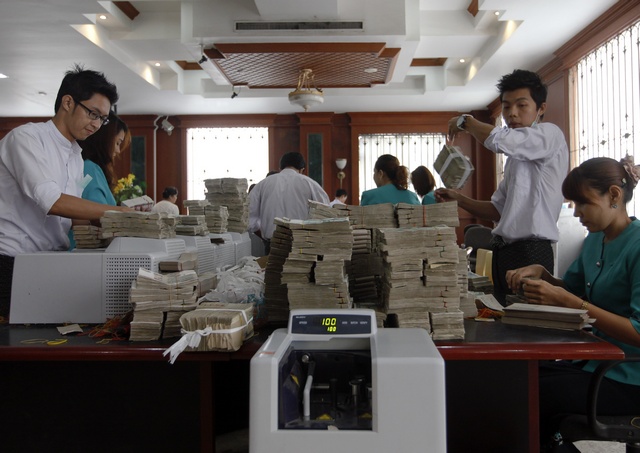Burma’s new foreign investment law may be more restrictive than its predecessor, experts said, after an updated draft of the much-anticipated foreign direct investment (FDI) bill was leaked to Reuters last week.
Experts have labelled the government’s move to limit foreign investment in certain sectors as “retrograde” and fear protectionist economic policies, aimed at sheltering domestic markets, could inhibit the impoverished country’s future socioeconomic growth.
The new draft moves to restrict 100 percent foreign ownership in certain sectors and bans investment in “small and medium industries and enterprises; agricultural and livestock business being carried on by local business people; retail business and small to medium service enterprises,” according to Reuters.
“This is an example of the ‘creeping protectionism’ many of us have feared,” said Australian economist and Burma expert Sean Turnell.
“It is so important that, at this critical juncture, Myanmar [Burma] does not lock its economy up in the clutches of old vested interests,” said Turnell.
Burma has been going through a series of economic and political reforms aimed at attracting foreign investment to the impoverished Southeast Asian state; however, these latest updates to the foreign investment law may do little to encourage the confidence of foreign investors.
The proposed restrictions to foreign investment could alleviate some of the fears voiced by domestic firms that the new investment law will favour foreign competitors; however, experts warn that protecting the domestic market in the short term will not result in healthy, long-term economic growth.
Jared Bissinger, a PhD candidate at Australia’s Macquarie University studying Burma’s economy, said the best medicine to kick-start the country’s economy, crippled from more than 50 years of economic mismanagement, is to adopt policies that create a fair, predictable and stable business environment from which everyone enjoys some benefits.
“If you keep restricting competition, what incentives will there be for these local companies to ever become strong enough to compete against foreign investors,” said Bissinger.
He said lack of funding is one of the major concerns voiced by domestic enterprises, but this could be improved if future reforms permit greater freedom within Burma’s financial sector, which would allow banks to better support the private businesses and stimulate economic growth.
“There is certainly justification for some of the feeling among local businesses,” said Bissinger.
“When it comes to access to credit, for example, they’d be at a huge disadvantage compared to international competitors.”
But local firms that play their cards right will find they have a lot in their favour, such as essential knowledge of local markets and an understanding of the bureaucratic challenges in post-sanction Burma.
“A compromise solution might entail allowing some protections in certain areas, but only for a specified length of time,” said Bissinger.
While the Burmese government is balancing the need to firm up the details of its foreign investment law to give greater confidence to international investors, such an important piece of legislation takes time to get right, said Maung Maung Lay from the Union of Myanmar Federated Chambers of Commerce and Industry (UMFCCI).
“There’s no need to rush with all the mistakes – that will tarnish the image of the government,” said Maung Maung Lay.
“This should not be [an] on again – off again policy like our electricity. It will be frustrating for the potential investors who are not here merely to gamble,” he said.
Maung Maung Lay said the government is fine tuning certain aspects of the new law to “alleviate the concerns of the locals and get input from all the stakeholders.”
The foreign direct investment (FDI) amendment bill builds on existing legislation enacted in 1988 and is tipped to permit foreign investors to expand their presence in joint ventures by allowing them to invest within the public or private sector.
The bill is also likely to increase land lease terms and extend tax holidays to five years.
In an earlier draft of the FDI bill, foreigners could lease land for 30 years and would be allowed two 15-year extensions, compared to an updated period of 50 years extendable for two 10-year terms, depending on the nature of the business and the size of the investment.
And while some investors will be waiting for details contained in the new foreign investment law to be officially announced before firming up their own investment decisions, its importance should not be overstated, said Turnell.
“Countries are always ‘tweaking’ their investment laws, and we should not see this as the ‘be all and end all’,” he said.
Turnell claims the FDI law was an important signalling device to international investors that Burma is a reliable place to do business.
“But the most important thing is that the law progresses in a way that creates confidence in the process in which it is made, and that the law itself be sound and reasonable,” said Turnell.
“It does not have to be, and should not be, excessively generous to international investors, especially in areas (such as resource and energy extraction) where they will come anyway.
“On the other hand, it is also important that the law not be the vehicle to protect vested interests at the expense of the broader good,” said Turnell.
New FDI law or old, foreign investors remain faced with the many challenges that come with doing business in Burma, including the lack of legal or physical infrastructure as well as a crippled banking sector, an untested judicial system and layers of bureaucratic red tape.
According to government sources, the FDI law will likely be debated in parliament this month, according to government sources.
-Kate Kelly is a pseudonym for a journalist working inside Burma.



